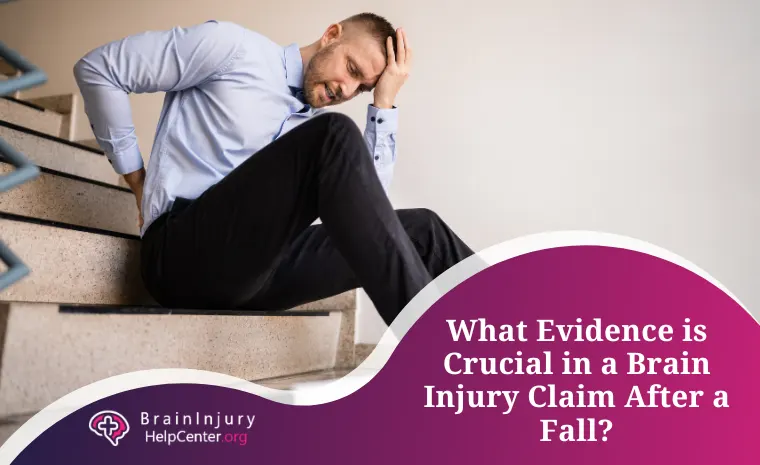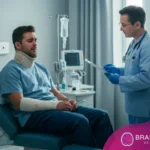What Evidence is Crucial in a Brain Injury Claim After a Fall?
Accidents can happen in the blink of an eye, and a seemingly innocent fall can lead to serious consequences, particularly when it involves a brain injury. Whether it’s a slip and fall, trip and fall, or any other type of fall caused by negligence, understanding what evidence is crucial in a brain injury claim after a fall is vital.
This blog will explore the key elements of evidence required to build a robust case after a fall-related brain injury, while also discussing the relevant laws in California.
Sustained injuries after a fall?
California Laws Relevant to Slip-and-Fall Claims
In California, slip and fall claims fall under premises liability law. Property owners have a legal duty to maintain safe conditions for visitors, and if they fail to do so, they may be held liable for bodily harm that occurs on their property. Some key legal points to consider include:
Duty of Care and Comparative Negligence
Under the California Civil Code Section 1714, property owners owe a duty of care to visitors and must take reasonable steps to prevent foreseeable hazards. This includes conducting regular inspections, addressing potential dangers, and providing adequate warnings.
California follows a comparative negligence rule under this law, meaning that if the injured party is found partially responsible for the accident, their compensation may be reduced proportionally.
Statute of Limitations
It’s crucial to be aware of the statute of limitations for filing a personal injury claim in California. Under the California Civil Code Section 335.1, you have two years from the date of the accident to file a brain injury accident claim, so prompt action is essential.

The Importance of Evidence
When pursuing a traumatic brain injury claim following a fall, the right evidence can make all the difference in establishing liability and obtaining fair compensation. Gathering solid evidence helps demonstrate that the fall was caused by negligence or unsafe conditions, ultimately strengthening your case.
The following types of evidence can be crucial in such a claim:
- Medical Care Records: Comprehensive medical records detailing the initial examination, diagnosis, treatment, and prognosis of the brain injury are vital. This includes MRI or CT scan results, neurological assessments, and any follow-up appointments. Common symptoms of a traumatic brain injury after a fall are:
- Headache
- Memory loss
- Cognitive impairment
- Nausea and vomiting
- Fatigue or drowsiness
- Changes in behavior or mood
- Loss of consciousness
- Expert Medical Opinions: Expert testimony from qualified medical professionals can help explain the connection between the fall and the brain injury. Neurologists, neurosurgeons, and other specialists can provide insights into the nature and severity of the injury.
- Witness Statements: Eyewitnesses who saw the fall and its immediate aftermath can provide valuable testimony about the circumstances of the incident and the impact it had on the injured person.
- Photographs and Videos: Visual evidence of the accident scene, such as photographs or videos, can help recreate the conditions leading to the fall and provide context for the injury.
- Accident Reports: Any official accident reports, such as those filed by law enforcement or property management, can help establish a timeline and describe the conditions that led to the fall.
- Medical Bills and Expenses: Detailed records of medical expenses, including hospital stays, surgeries, medications, therapy sessions, and rehabilitation, can demonstrate the financial impact of the injury.
- Loss of Earnings: Documentation of lost wages and income due to the injury can support claims for compensation related to diminished earning capacity.
- Rehabilitation and Treatment Plans: Evidence of the injured person’s participation in rehabilitation programs, therapy sessions, and prescribed treatment plans can demonstrate their commitment to recovery and ongoing medical needs.
- Neuropsychological Assessments: Neuropsychological testing can offer objective measurements of cognitive and psychological impairments. These assessments can provide a clearer picture of the extent of the damage and its impact on the injured person’s daily life.
- Occupational and Vocational Impact: Testimony from vocational rehabilitation experts can help illustrate how the brain injury has affected the injured person’s ability to perform their job or pursue their chosen career path.
- Impact on Quality of Life: Evidence demonstrating the impact of the brain injury on the injured person’s overall quality of life, relationships, hobbies, and recreational activities can further emphasize the extent of their suffering.
Every brain injury claim is unique, and the evidence required can vary based on the specific circumstances of the case. Consulting with an experienced personal injury lawyer is highly recommended to ensure that all relevant evidence is gathered and presented effectively to support the claim.
Unsure of what to do after getting injured from a fall?
Factors That Contribute to Determine Settlement Amount
While establishing an average settlement for a traumatic brain injury can be challenging, several common elements can impact your case:
- Injury Severity: The magnitude of the injury plays a significant role in the potential settlement. While more severe traumatic brain injuries generally lead to higher settlements, even mild cases can result in enduring symptoms that disrupt work and daily life. Conditions like post-concussion syndrome can persist over years.
- Projected Medical Expenses: The financial value of a traumatic brain injury case largely hinges on present and future medical costs associated with treatment. This encompasses hospitalization, therapy, medications, home healthcare, home modifications for accessibility, and potential long-term care expenses, which can amount to substantial sums over a lifetime.
- Age: Younger victims with prolonged medical and therapeutic requirements often receive larger settlements, especially when involving legal experts specializing in child brain injuries.
- Pain and Suffering: Traumatic brain injury settlements factor in non-economic damages like pain, suffering, and diminished quality of life. Continued pain, headaches, memory issues, concentration problems, and the inability to enjoy previous activities contribute to potential compensation.
- Liability: Your degree of fault in the accident leading to the injury can impact the damages awarded. A comparative negligence approach reduces awarded damages based on your percentage of fault. For instance, if awarded $100,000 with 25 percent fault, your recovery would be $75,000.
- Gross Negligence: In cases of egregious disregard for safety, punitive damages may be awarded beyond regular compensation, reflecting the at-fault party’s reckless behavior.
- Insurance Policy Limits: Settlement amounts are constrained by the collective coverage of relevant insurance policies. Legal counsel can offer insights into applicable policies to optimize your potential payout.
Consult with an Award-Winning Personal Injury Lawyer
Various factors intersect to determine the settlement amount for a traumatic brain injury case. Consulting experienced attorneys is crucial to navigating these complexities and ensuring that you secure the most advantageous outcome.
Remember, the strength of a brain injury accident claim often depends on the quality and relevance of the evidence presented. Working closely with a skilled personal injury attorney who specializes in brain injury cases can help ensure that all necessary evidence is properly collected, organized, and effectively presented to maximize the chances of a successful claim.
You do not have to do all of these on your own.
The Brain Injury Help Center in California has a team of medical experts and brain injury lawyers, dedicated to help you get through your ordeal. If you are diagnosed with a brain injury from a fall, we have the necessary resources and expertise to help you.
Do not hesitate to contact us at (866) 576-0936 for a free consultation.









